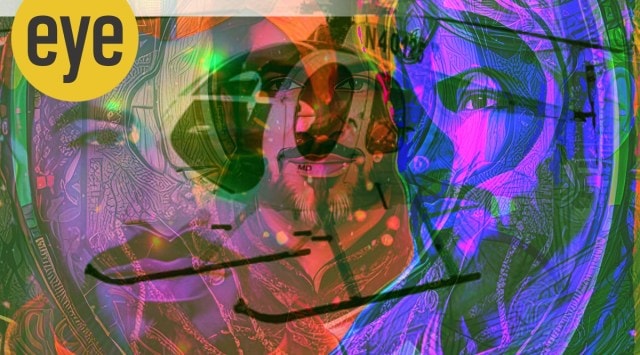How Doris Day’s Que sera sera became an anthem for life itself
What will be, will be — this is the mantra that stares me in the face whenever I am confronted with dire circumstances
 I found my calling to accept each moment and focus on the here and now (Credit: Suvir Saran)
I found my calling to accept each moment and focus on the here and now (Credit: Suvir Saran) The earliest lyric in my memoryscape in English is “Que Sera Sera, what will be, will be.” It isn’t Doris Day that I remember; my memory connects me to my papa and my mum singing this and to the energy that it created, the life that they blessed us with, how they navigated the world where we came of age, and how we are today. “What will be, will be”— this is the mantra that got etched permanently into my psyche and stares me in the face whenever I am confronted with tough questions and dire circumstances.
My earliest memories also take me to the passing of my paternal grandfather, Bade Papaji. When I close my eyes, I see a handsomely attired man who spoke impeccably, in a firm yet warm cadence. A man who was strict, yet kind enough to give me a single cookie if I touched his feet and received his blessings first thing in the mornings. I remember he had a walking stick, and I remember his larger-than-life glasses that made his eyes seem bigger than big to me, a kid barely a handful of years old. His death is a flurry of details and a mashing of geographies, interlaced with images of my father and mother, my gorgeous Bua and my Papa’s only sibling and sister, Deepa. Yet, it isn’t mourning and loss that I remember vividly. It is the Bhandara, the offering of food and the non-stop singing of devotional hymns by relatives, especially Munni Mausiji, my paternal grandmom’s youngest sister, that have remained the clarion image from that moment of sombre, heartfelt despair. Between the food and the singing, I managed to believe the words of the song my parents sang about making one’s peace with what will be.
Life continued, with photographs of Bade Papaji becoming part of our life, and a Radha Soami satsang, a prayer meeting with hymns sung in his memory. Dadi, my paternal grandmom, would have foods cooked that he loved; her older sister Vimla Bahadur — Mausiji to us kids — would be the only relative other than my Bua and her three kids and Hargobind Prasad Bhatnagar, her husband, who would be at this prayer ceremony. These prayer meetings were an annual ritual to remember our beloved ancestor and through that also connect with our families’ traditions and goings on. When Vimla Mausiji lost Nagendra Mausaji and her children moved away, she would come alone and spend time at our home. My memory of her is of a woman who, despite her senior age, lived life with the same diktat of whatever will be, will be. She managed her life with grace and dignity, with generosity of self, and gave us, through her fine example, a lesson in living with a focus on what matters and letting go of wanting control beyond that, in the outcomes that weren’t in our mortal hands. I have letters she wrote to me when I moved to Mumbai to go to school, and then to NYC, and hers was love given to me for who I was in relationship to her, unfettered and never judging, pure and forever welcoming, full of hope, unafraid to give, and disinterested in worry about what will be.
I have always had the mind, heart, and soul of an artist, they tell me, even though I have never labeled myself anything other than human — a person with a ticking heart, a thinking brain, a feeling soul. I realised at a young age that my nighttime dreams were not only dark, but prophetic. Too many sicknesses and deaths in our circle of relatives and friends had been part of my dreamscapes, and so early in my teen years, I taught myself to wake up and not allow dreams to take me in their grip.
But man must dream, so I began dreaming while awake. Circumstance and my age had me working a full-time job and going to school full-time in New York City. Hungry to grow, eager for adventure, masterful with my tactile hands, and blessed with the gift of gab, I found myself sailing with the wind towards new ports and, in doing so, facing both storms and still moments with alacrity and fortitude. My mother had always advised me to welcome and accept failure and pain as readily as I did successes and victories, and so when things got tough, I found my calling to accept each moment and live knowing what will be will be, to focus on the here and now and give it my best.
Unexpectedly dark and treacherous storms brought me back to India a few years ago. Barely functional, visibly gaunt, inhabiting the world of the blind for a flash, I fought to escape a zombie world where fact and fiction, dreams and reality, Delhi and New York, life and death melded together in ways that broke me apart, tore me into shreds, and thrashed around in my brain like helicopter blades with a fury of sounds and motion that was only heard and felt by me. When I managed to get relief from the helicopter, a scorpion would take its place, scratching desperately to get out of my skull and piercing my eyes to get out of the cage that was my body.
In that 21-month period, “Que Sera, Sera”, was once again the song that I was making peace with. Unable to communicate with clarity, rendered useless by life and circumstance, and losing everything tangible that was of significance to me and brought me comfort, I learned to cry, and cry freely, for the first time. Tears gave me strength. They were the only expression I had when at a loss for words and voice, sight, and sound. When doctors didn’t have happy answers, I heard again in my mom’s repeated pleas the call to accept what was and to leave the rest to life and happenstance. She asked me to feel at home, she gave me comfort and dignity, love and nurturing, and connected me with family and friends. She was not bothered by how I looked or behaved, and so freed me of my fears and inhibitions, my struggles and suffering, and gave me reason to live, knowing that I had to live today, live fully and wholly, and accept that what would be, would be.
The Man Who Knew Too Much is an Alfred Hitchcock classic (1956) that has Doris Day singing “Que Sera, Sera” at its climax. Through this song, the Master of Suspense taught us that in life, as in good literature, films and drama, having outcomes held in abeyance is more thrilling than knowing all the answers ahead of time. Starting a new life in India at 50, having to prove my culinary chops to a new nation where I am once again setting up home, being single and ready to mingle but having my age pose an uphill challenge, I smile readily and heartily because I truly believe that “the future’s not ours to see.” Que sera, sera!
Photos



- 01
- 02
- 03
- 04
- 05




























